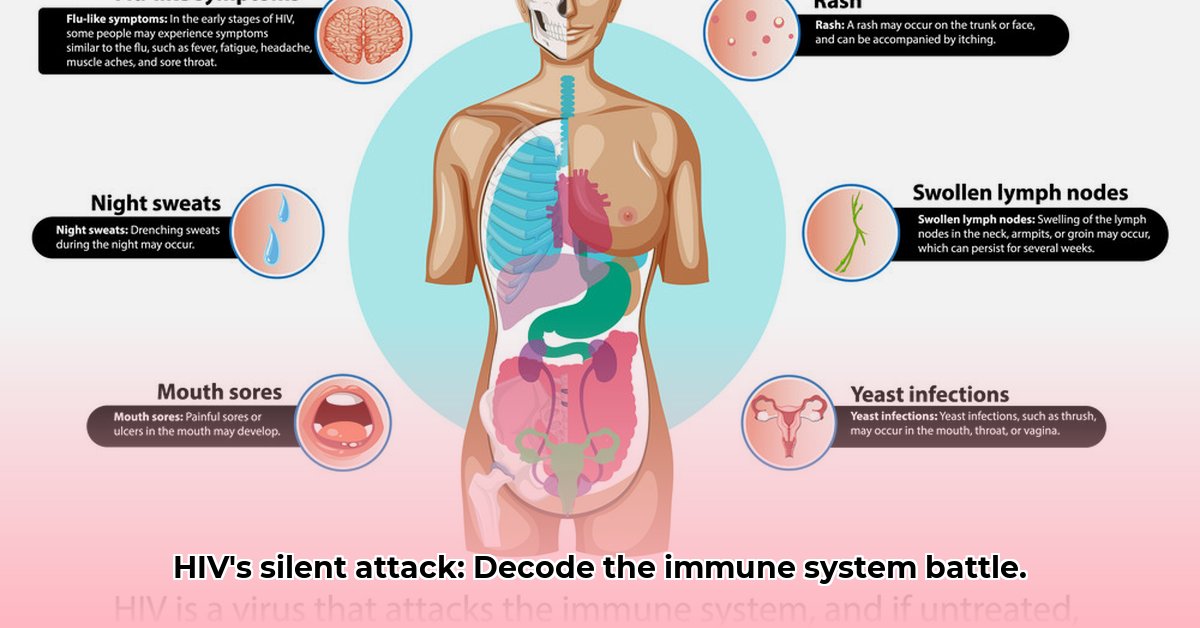
How HIV Attacks Your Immune System: A Simple Explanation
Eish, HIV. It's a real bru, isn't it? This virus doesn't mess around; it targets the very heart of your body's defence system – your immune system. Think of your immune system as a massive, well-trained army, constantly fighting off germs and keeping you healthy. HIV, however, is like a sneaky saboteur, targeting the army's generals: your CD4+ T cells. These cells are vital for coordinating your immune response. Without enough of them, your body becomes vulnerable to various infections. Let's break down exactly how this happens.
HIV's Sneaky Invasion: A Step-by-Step Look
HIV's attack is a cunning multi-step process:
Attachment: HIV, like a key fitting into a lock, attaches itself to the CD4 receptors (the "locks") on the surface of your CD4+ T cells.
Entry and Replication: Once attached, HIV slips into the cell and forces the cell to produce more HIV; it's essentially hijacking your cells' machinery.
Viral Escape: These newly created viruses then burst out of the infected CD4+ T cell, spreading the infection to other healthy cells.
Immune System Depletion: This cycle repeats, steadily depleting your body's supply of CD4+ T cells, weakening your immune system.
Stages of HIV Infection: From Acute to AIDS
HIV infection progresses through distinct stages:
Acute Infection: Initially, you might experience flu-like symptoms or nothing at all. This stage typically goes unnoticed by many, as symptoms are relatively mild.
Chronic Infection (Clinical Latency): This stage can last for years. The viral load (the amount of HIV in your blood) remains relatively low. This is managed with ART. However, the CD4 count slowly decreases. Early diagnosis and commencement of antiretroviral therapy can significantly impact the progression of the illness.
AIDS (Acquired Immunodeficiency Syndrome): Without treatment, the chronic infection eventually progresses to AIDS, characterised by a severely depleted CD4 count and increased susceptibility to opportunistic infections.
The Impact: A Compromised Immune System
The progressive loss of CD4+ T cells leaves your immune system severely compromised. This makes you vulnerable to opportunistic infections – illnesses that wouldn't typically affect a healthy person. These can range from minor infections to serious, life-threatening conditions.
Treatment and Prevention: Taking Control
Fortunately, we have effective tools to fight HIV and prevent transmission:
ART (Antiretroviral Therapy): ART uses a combination of medicines to suppress HIV replication, protecting your immune system and preventing the progression to AIDS. Early ART is absolutely key. Many people who start treatment early enjoy a long and healthy life expectancy. Taking your medication as prescribed is vital.
PrEP (Pre-Exposure Prophylaxis): This is medication taken daily by people at high risk to help prevent HIV infection.
PEP (Post-Exposure Prophylaxis): If you think you may have been exposed to HIV, PEP is medication that can prevent infection if taken within 72 hours of potential exposure. It's important to seek medical attention immediately.
Safe Sex Practices: Using condoms during sex is a simple but highly effective way to prevent HIV transmission. Knowing your status and your partner's status is also a crucial part of safe sex.
Living Well with HIV: Support and Empowerment
A diagnosis of HIV isn’t a life sentence. With proper medical care and support, people with HIV can live long, fulfilling lives. This involves:
Adherence to ART: This is non-negotiable. Sticking to your treatment plan is crucial for suppressing the virus and maintaining your health.
Regular Check-ups: Regular monitoring of your CD4 count and viral load is essential to track your progress and adjust your treatment if needed.
Support Networks: Connecting with family, friends, support groups, or therapists – remember, you're not alone in this journey. Taking care of your mental and emotional health is just as important as taking care of your physical health.
Conclusion: Knowledge is Power
Understanding how HIV attacks your immune system is the first step towards protecting yourself and others. Prevention, early detection, and consistent adherence to treatment are essential for managing HIV and living a long, healthy life. Remember, there's a wealth of support and information available – don't hesitate to reach out for help. You've got this!